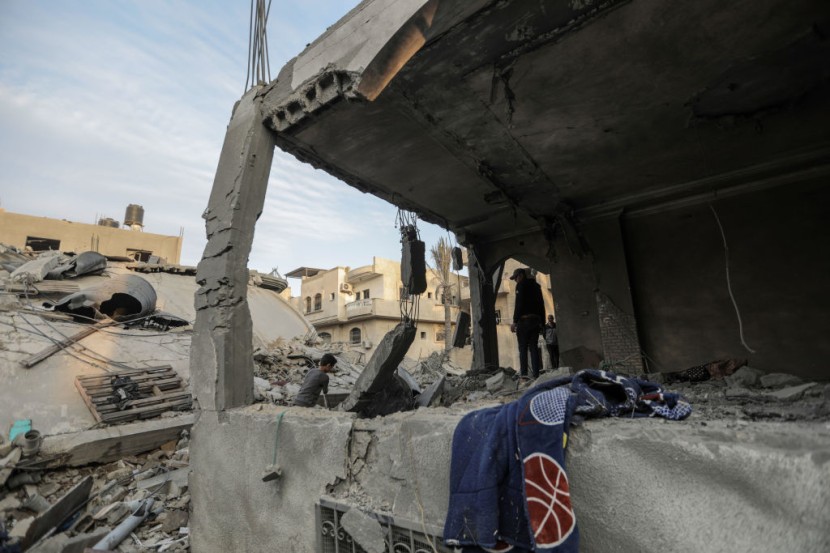As Israeli forces press on with their operations in northern Gaza, the Israeli Defense Forces (IDF) have released photos of their soldiers actively engaged in the region.
The absence of BBC journalists, coupled with a communication outage, has made verifying information from the area difficult, as per BBC News.
Humanitarian Concerns for Israeli Forces

Military expert Chris Morris has suggested that Israel could adopt Egypt's previous strategy of using sewage to hinder tunnel operations. However, this approach has potential repercussions for the evolving humanitarian crisis in the besieged enclave.
In 2013, the Egyptian military employed a pungent tactic of flooding smuggling tunnels between Sinai and Gaza with sewage-soaked soil.
This measure sought to stem the flow of weapons and militants into Sinai from Gaza. Although the method proved effective from a military standpoint, Morris emphasizes that it may adversely affect the humanitarian situation and optics.
The tunnels have been vital for essential imports to Gaza and a significant revenue source through smuggling taxes for Hamas. Morris also outlines other potential strategies available to Israel to confront Hamas' underground tunnel network, including deploying special forces, demolishing tunnel entrances, using foam bombs to block access, and employing sophisticated aerially targeted weaponry.
As Israeli forces intensify efforts to storm Hamas' labyrinthine tunnel network and secure the release of hostages, prospects for a negotiated deal with the terror group appear to wane. Gershon Baskin, who oversaw the 2011 hostage exchange with Hamas, cautions that IDF troops may soon resort to launching operations within the potential holding locations of hostages.
The urgency to secure the release of 239 Israelis and foreigners held captive in the underground maze is paramount as the ground offensive in Gaza persists. Baskin further warns of the possibility that Hamas terrorists may retaliate by harming hostages in response to Israeli incursions into the tunnels.
Dubbed the "Gaza Metro," Hamas' underground tunnel network stretches across approximately 311 miles, designed with deadly traps to deter intruders. Baskin, a seasoned negotiator, stresses the uncertainty surrounding the outcome of potential military operations, with the possibility of freeing hostages or losing them in the crossfire, according to The Sun.
Hamas Using Hospitals as Command Centers
It is imperative to acknowledge that many prisoners released in previous exchanges, including Hamas ringleader Yahya Sinwar, later engaged in attacks that claimed the lives of at least 1,200 Israelis.
Following their border incursion, Hamas gunmen perpetrated massacres and took numerous civilians hostage, leaving the bomb-ravaged Gaza Strip profoundly scarred.
Recent developments have raised concerns about Hamas potentially exploiting hospitals in Gaza as cover for their command centers. Israeli forces claimed to have uncovered one such lair and weapons headquarters in the basement of a hospital.
At the same time, another central medical facility, Al Shifa, has been surrounded by IDF troops and tanks. Fuel shortages have rendered these hospitals ill-equipped to provide adequate care, forcing doctors to resort to desperate measures such as wrapping newborn premature babies in tinfoil to maintain their body temperature.
The dire shortage of medical staff, supplies, and vital resources exacerbates the already precarious conditions patients and medical professionals face.
Israel's recent distribution of leaflets in southern Gaza, urging civilians to evacuate their homes and seek refuge in designated shelters, suggests a possible expansion of the offensive. The aim is to prevent further overcrowding of UN-run shelters and family residences by evacuees who already heeded previous warnings.
Daily air raids have become common, with operations intensifying in the southern region. The toll on Palestinian lives is devastating, with an estimated 11,200 fatalities since the initiation of Hamas attacks near Israel's border, with approximately two-thirds of the casualties reported as women and children.
Over 1.5 million people have been internally displaced in Gaza, where access to food, water, and electricity remains scarce.
Philippe Lazzarini, the commissioner general of the UN agency for Palestinian refugees, has expressed concerns about deliberate attempts to hinder their efforts to support over 800,000 displaced Palestinians.
The agency has been desperately seeking access to fuel to sustain its operations. The increasingly dire situation prompted UN human rights chief Volker Turk to call for an international investigation into allegations of violations of international humanitarian law during the conflict, Mirror reported.
© 2026 HNGN, All rights reserved. Do not reproduce without permission.








